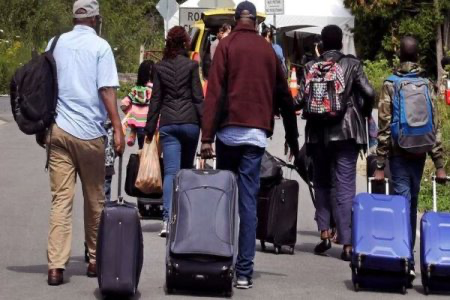The pursuit of greener pastures is never a straight path. It is a pilgrimage of hope, and struggle, and unexpected discoveries.
When I left Nigeria for the UK, I held onto dreams bigger than my suitcase, excited for opportunities that would transform my life, the greener grass of the west. Unknowing to me, the true transformation would not happen in the land I sojourn, but in understanding of identity, belonging and resilience
To be far away from Nigeria and her many problems; is that not the reason we japa and seek better opportunities in the UK?
My fellow Diasporans, the pursuit of opportunities come with many invisible burdens. We mustn’t be disillusioned by the so-called greener pastures. As we enter this foreign land, there is no welcome sign or information desk warning us of the not so sunny side of UK living. I’m talking about the inner struggle of retaining your Nigerian identity and yet, integrating into British culture. No one really talks about the drain of the constant culture shock! You will soon find yourself standing dumbfounded and asking, ‘Is it that I don’t know anything?’
My journey began in a small town in Kent, where the most exciting attraction was the grocery store. I arrived, bright eyed, ready to take on this new chapter in my life and experience new people and culture. I was the main character in this multicultural narrative. Me, the exciting international student, dazzling the locals with stories from my homeland. I was filled with hopeful trepidation, here to start a new and better life. Reality was not the script I signed on for!
The shock of difference
Lesson one: Life is not like the movies! Kent showed me ‘shege’.
In this small town, diversity was a rarity, with us six international students at its forefront. We were shiny object for the rest of the students to gawk at, subjects of curiosity- and often ignorance.
My first day in school was a downpour of cultural dissonance. I spent the day answering odd questions like ‘how many elephants are in your backyard?’ and ‘do you swing on trees to get to school?’ The ignorance of the locals was dumfounding, revelation of the deep-rooted misconceptions about African, about me.
It all came to head in Literature class. A classmate, seemingly innocent, asked me ‘how come you speak English so well?’ In that moment, I looked around; she couldn’t have been talking to me.
When you leave your home, your culture and everything you know to seek opportunities, you go with hope. At that moment, when this girl asked me about my English, hope felt like a dimming light in the distance. This was a backhanded question and a micro-aggression that sobered me. Maybe I could have tolerated all the differences England showed me: the weird food, the accents that made me listen harder, the perpetual grey sky, but I knew, I wasn’t going to fit in here.
I began to struggle with anxiety as everything I did or said, which would have been normal in Lagos, was odd. The way I pronounced ‘accommodate’ will earn me looks in class. My loud roaring laugh resulted in sneers. And my inability to appreciate the bland British cuisines made me ‘stuck up’. I retreated into myself, a shell of the vibrant Lagosian I was.
The harder I tried to understand the culture I would live in for the next few years of my life, the more marginalised I was.
So, I kept my head down, surrounded by the pain of my rejection by England.
Alas, this is not a tragic story, my people. For where there a will, there’s a way. And the way came in form of community.
We Nigerian students built our safe haven. Our games night was more than entertainment; it was our way of cultural preservation. We’d keep up with latest Nigerian trends. The night Olamide dropped ‘Science Student’, we didn’t just listen; we debated the songs’ ban from Nigerian Radios and its cultural impact.
We shared home cooked meals our parents sent us and revelled in our freedom to speak freely in Nigerian slangs and accents. We teased each other about the fake accents we had adopted, as self-preservation, yelling ‘gbagaun’ when someone stumbled on their words.
The otherness, England relegated us, created a deep longing for the motherland and we satisfied our longing by having each other’s back. Therefore, resisting forced assimilation and erasure we faced daily.
The UK taught me that greener pastures are not just geographical locations, but internal resilience. While no welcome entourage awaits immigrants at the airport, community becomes that warm reception. You may be running from the challenges of Nigeria, but you will find that running towards Nigerian people in this foreign land offers a comfort you didn’t know you needed. Our diaspora isn’t just about survival. Our diaspora is the bridge between cultures, a pocket of home. A Nigeria away from Nigeria.
To my fellow sojourners, our japa is not about escaping but about flourishing. We do not just seek greener pastures, but we cultivate our gardens of cultural awareness and preservation. The grass might seem greener on the western side, but true growth is in how we nurture our roots, no matter the soil.
•Mobolaji-Okoya can be reached via aishaokoya@yahoo.com
